244 years ago today, the Articles of Confederation were officially adopted by the Continental Congress after ratification by all 13 states as the supreme law of the land in post-Revolutionary America. Calling into existence the most limited and constrained form of government ever achieved by modern man, affording it only those powers the former colonies had recognized as belonging to the King of England. There was no president, no executive agencies, no judiciary, and no tax base. READ More… (1781)
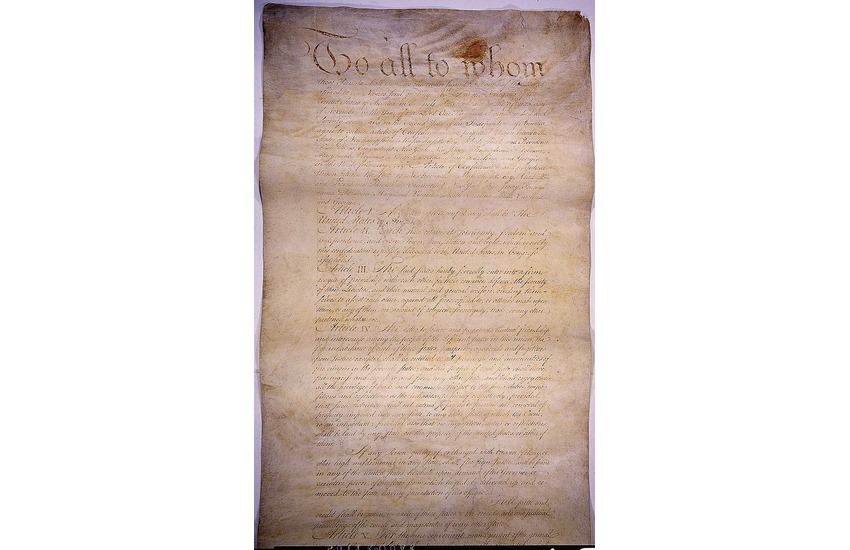
Often overlooked by American historians and Constitutional scholars as an object of study, the Articles of Confederation delegated all powers unto the states apart from a few that were expressly provided for. Of those powers, war, military organization and privateering, foreign policy and treaty-brokering, and international commerce were to be reserved for the central government.
The only other provision of centralization was the first and thirteenth articles, which state that the states should enter into a “firm league of friendship” and that the Articles should be “perpetual.”
Unlike the Constitution that was to come and replace it, a number of the articles detail ‘positive rights.’ What we understand to be the Bill of Rights, consists of 10 ‘negative’ rights, as in “Congress shall make no law that…” or “…shall not be infringed.” Article 4 of the Articles of Confederation reads that the document seeks “to secure and perpetuate mutual friendship and intercourse among the people of the different States in this union,” and establishes “equal treatment and freedom of movement for the free inhabitants of each state to pass unhindered between the states,” a rare example of the Founders using this kind of positive language.
In legal theory, the difference can be understood by considering: who is it that is guaranteeing this right? This question of sovereignty can be avoided by using negative language, but positive language implies that someone or something has the power to grant something and therefore rule over them, which, the Founders would argue, requires that the people give their consent to be ruled.
MORE Good News on this Date:
- The Brazilian city of Rio de Janeiro was founded (1565)
- The state of Michigan formally abolished the death penalty (1847)
- Albert Berry made the first parachute jump from a moving airplane (1912)
- 62 years ago today, the Peace Corps was established by President John F. Kennedy, a service group that has sent more than 200,000 volunteers to 139 host countries around the world (1961)
- Uganda became self-governing and held its first elections (1961)
- New Zealand Prime Minister David Lange strode onto the international stage to win the Oxford Union debate, arguing that “nuclear weapons are morally indefensible”, and two years later NZ became a nuclear-free zone (1985)
- The US Supreme Court abolished capital punishment for juvenile offenders, ruling it unconstitutional to sentence anyone to death for a crime committed while under the age of 18 (2005)
- Spring begins in Denmark; Autumn begins in Australia; Bosnia and Herzegovina celebrate Independence Day
Happy 81st Birthday to Roger Daltrey, singer-songwriter for The Who. The band’s co-founder put the stutter in My Generation, and the scream in Won’t Get Fooled Again, and added to the classic repertoire of rock and roll stage antics the swinging of a microphone like a lasso. He is as well-decorated a musician as rock musicians come, and boasts a knighthood, and lifetime achievement award from the British Phonographic Industry and Grammy Industry. He’s also a talented actor—and was a recurring character and the TV adaptation of Highlander.

He grew up with schoolmates–and bandmates–Pete Townshend and John Entwistle in a working-class suburb of London. His first guitar was one of his own creations; he carved an imitation cherry red Stratocaster from a block of wood.
The other members of The Who fired Daltrey from the band in late 1965 after he beat up their drummer Keith Moon for supplying illegal drugs to Townshend and Entwistle.
A week later, Daltrey was admitted back to the band but was told he’d be on probation. He promised that there would be no more violent outbursts or assaults. Daltrey recalled, “I thought if I lost the band I was dead. If I didn’t stick with the Who, I would be a sheet metal worker for the rest of my life.”
With each of the Who’s milestone achievements, Tommy, Who’s Next, and Quadrophenia, Daltrey was the face and voice of the band as they defined themselves as the ultimate rebels in a generation of change. When Ken Russell’s adaptation of Tommy appeared as a feature film in 1975, Daltrey played the lead role, and was nominated for a Golden Globe Award for “Best Acting Debut in a Motion Picture” and appeared on the cover of Rolling Stone magazine on 10 April 1975. Check out The Who music on Amazon. (1944)
53 years ago today, Pink Floyd released The Dark Side of the Moon, the third most-sold album of all time, and a truly revolutionary piece of music. The Dark Side of the Moon is among the most critically acclaimed albums and often features in professional listings of the greatest albums. Its music is nearly unparalleled in progressive rock, and its lyrical themes of conflict, mental illness, greed, time, and death, coupled with a mixture of stanzas from philosophers and the band’s road crew, have surely inspired countless artists.
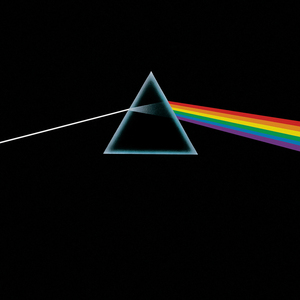
Some of the profits were invested in the production of Monty Python and the Holy Grail. In the 1990s, listeners discovered that playing The Dark Side of the Moon alongside the 1939 film The Wizard of Oz produced moments of synchronicity, and suggested this was intentional, though the band has said this was utter hogwash.
The original name of the album as it was performed for critics a year ahead of its release was Dark Side of the Moon: A Piece for Assorted Lunatics. For the snippets of voices heard throughout the tracks, Paul and Linda McCartney were interviewed along with many of the band’s road crew, but their answers were judged to be “trying too hard to be funny”, and were not included on the album.
A 50th Anniversary deluxe remastered edition has been released for the occasion. (1973)
Happy 153rd Birthday to America’s first—and the world’s first—National Park, Yellowstone! Known by many names over the years, from “Mi tsi a-da-zi,” to “Colter’s Hell” to “Wonderland,” its collection of geysers, hot springs, and boiling mud pools, nestled among pine forests, river gullies, and wide plains is totally unique in the world.
Spilling over the northern border of Wyoming into Idaho and Montana, and reaching down across Jackson Hole, the Grand Tetons, and the surrounding foothills, Yellowstone lies at the heart of the largest remaining nearly-intact ecosystem in the Earth’s northern Temperate Zone.
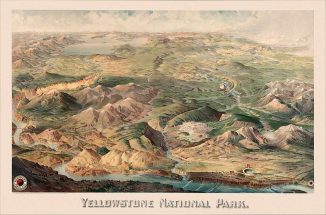
During expeditions across the West during the early 1800s, reports occasionally came back of a place where rivers boiled, the ground shifted and melted away, and trees turned to white rocks. They were dismissed as fairy tales— as John “Colter’s Hell” based on the man’s stories. Eventually, mountain man Jim Bridger reported the same, but it wasn’t until Nathaniel P. Langford’s expedition following the Civil War that people began to consider it a reality. His accounts, published as The Wonders of Yellowstone,” paired with the corresponding account of Truman C. Everts, who got completely lost for 37 days in what would become the park, and who fell into hot mud pools, was chased by wolves, and had to hide up a tree from a mountain lion, convinced the legislative branch a set aside an enormous chunk of that region as a “nation’s park”.
27 Native American Tribes have historic and modern connections to the land and its resources. For over 10,000 years before Yellowstone became a national park, it was a place where Native Americans lived, hunted, fished, gathered plants, quarried obsidian, and used thermal waters for religious and medicinal purposes. Today it’s one of the only places in North America one can find both wolves and grizzly bears.

For the 150th anniversary, the National Parks Service hosted events all year to commemorate, celebrate, and teach, everything to do with the majesty of the park. WATCH Nat Geo’s brief history of Yellowstone… (1872)
84 years ago today, Captain America was first published by Timely Comics, which became Marvel in the 1960s. Created by cartoonists Joe Simon and Jack Kirby, their character was a patriotic super-soldier who often fought the Axis powers of World War II—and it was hugely popular during the wartime period. The series was discontinued in 1950, but Marvel revived it in 1964, and it’s remained in publication ever since.
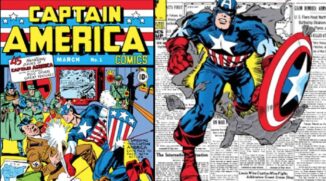
Dressed in stars and stripes and wielding an indestructible shield that he throws as a projectile, the superhero is the alter ego of Steve Rogers, a frail young man who was enhanced to the peak of human perfection by an experimental “super-soldier serum” after joining the military to fight in WWII. When the war ended in the 1940s, Rogers became trapped in ice and survived in suspended animation until he was revived in modern times. A highly respected man, Captain America became the long-time leader of The Avengers.
In Simon’s autobiography, we learn that Captain America was consciously a political creation because he and Kirby were appalled by the actions of Nazi Germany and they wanted to voice their views to the vocal anti-war contingent in the US. (1941)
Happy 56th Birthday to the diverse Spanish actor Javier Bardem who won an Academy Award for his portrayal of an evil villain in No Country for Old Men, but also equally delivered when he played a romantic lover in Eat, Pray, Love. (1969)

Happy 71st Birthday to Ron Howard, director, producer, narrator, and actor who played teenager Richie Cunningham on Happy Days.

His 2001 film A Beautiful Mind won the Academy Award for Best Picture and earned Howard the Oscar for Best Director. Among his many films, he directed Apollo 13, Cocoon, The Paper, Backdraft, The Da Vinci Code, and How the Grinch Stole Christmas. (1954)
215 years ago today, the pianist Frederic Chopin was born in Poland. The child prodigy became a virtuoso and composer who maintained his worldwide renown as a musician whose “poetic genius was based on a professional technique that was without equal in his generation.” At 21, he settled in Paris, writing primarily for solo piano and supporting himself by selling his compositions and giving piano lessons, for which he was in high demand as an innovator of the Romantic era.

In the last 18 years of his short life—in poor health until he died at age of 39—the maestro Chopin lived reclusively, giving only 30 public performances, but was admired by contemporaries such as his friend Franz Liszt and Robert Schumann. His most famous piece is the heroic Polonaise In A-Flat Major, Op. 53. Watch a rendition of the difficult polonaise that has garnered almost 3 million views on YouTube. (1810)
SHARE the Music, Memories, and Milestones…


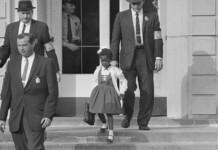

















[…] post Good News in History, March 1 appeared first on Good News […]
[…] Source: Good News Network […]